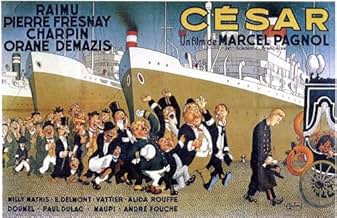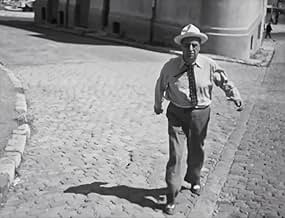César
- 1936
- Tous publics
- 2h 48m
Honoré Panisse is dying, cheerfully, with friends, wife, and son at his side. He confesses to the priest in front of his friends; he insists that the doctor be truthful. But, he cannot bring... Read allHonoré Panisse is dying, cheerfully, with friends, wife, and son at his side. He confesses to the priest in front of his friends; he insists that the doctor be truthful. But, he cannot bring himself to tell his son Cesariot that his real father is Marius, the absent son of César,... Read allHonoré Panisse is dying, cheerfully, with friends, wife, and son at his side. He confesses to the priest in front of his friends; he insists that the doctor be truthful. But, he cannot bring himself to tell his son Cesariot that his real father is Marius, the absent son of César, Cesariot's godfather. Panisse leaves that to Fanny, the lad's mother. Dissembling that he... Read all
- Honoré Panisse
- (as Charpin)
- Innocent Mangiapan
- (as Maupi)
- Le docteur Félicien Venelle
- (as Edouard Delmont)
- Pierre Dromard
- (as Bassac)
- Director
- Writer
- All cast & crew
- Production, box office & more at IMDbPro
Featured reviews
'Cesar', the only one of the Marseille trilogy to not be directly based on the play, is the third and final film in the trilogy and a great way to end it. It is not quite as good as my personal favourite 'Marius', but is on the same level as 'Fanny' for generally the same reasons. Despite having occasional story problems, 'Cesar' (named after one of my favourite characters of the trilogy) is the most human, most understated and most moving of the three perhaps and benefits greatly from having Pagnol in the director's chair again and the original cast returning yet again.
It though does have the slightest story of the three films in the trilogy and the only one to feel slightly contrived on occasions. That is my only complaint though.
Like 'Marius' and 'Fanny', 'Cesar' looks lovely and surprisingly evocative. In fact all the great things of those two films are here, for the same and different reasons. Scotto returns as composer and his score is equally as whimsical and charming. Did appreciate that 'Cesar' did have a much better beginning than that of 'Fanny' and that it got to the point much quicker.
There is some nice wit in the writing, the dialogue can be described in the same way as the dialogue in the previous two films. It succeeds in the humorous elements and even more so the emotional moments, balancing both well while having more of the latter. Did love how understated and compassionate the story was.
Which added to the poignancy and humanity of one of the most easy to root for love stories in early talkies. The characters are still compellingly real and their situations are still relatable and relevant now, did find that what happens resonated with me. Pagnol's direction is never too static or theatrical, he stays true to his roots while opening up the drama enough so it does feel cinematic.
Fanny is slightly underdeveloped again, but again that is namely down to the deeper characterisations of the other characters. Especially Cesar. The acting is great again, especially Raimu giving perhaps his best performance of the trilogy and he was astounding in 'Marius' and 'Fanny' as well.
Concluding, great and a more than worthy end to a wonderful trilogy of films. 9/10
While I loved MARIUS (1931) and Fanny (1932), I found myself falling asleep repeatedly while watching César. Again and again and again, I found myself dozing. At first, I thought I was just tired, but when I stopped the DVD each time I felt wide awake. I think in hindsight my reaction was because after the first few minutes of this movie, the trilogy, for me, was finished. In other words, the story was as complete as it should be and continuing it seemed superfluous. The 1961 Fanny film ended there, but continuing was probably, in hindsight, not the best decision. I honestly feel that the average viewer could see MARIUS and FANNY without having to see César. It just didn't seem necessary or compelling.
As far as performances and writing go, Raimu, who played Marius' father, was a marvelous actor and was excellent in all three movies. He was also fantastic in Pagnol's film La FEMME DU BOULANGER. An amazing talent. Also, Pagnol has written some amazing films apart from this series--try to see them all. It's just that of all of his work and the books I have read by him, my least favorite is César.
A sweet and fulfilling end to The First Ever and One of the Finest Trilogy of world Cinema. Cesar came after a gap of 4 years since Fanny and this was the only film in the Marseille Trilogy that was directed by writer Marcel Pagnol himself and wasn't adapted like earlier two films. One interesting thing i noticed about these 3 films is, these films are named after 3 characters but in the films the main focus is on other character. To elaborate a little, Marius (1931) was named after Marius but the film was more about Fanny's sacrifice. Next it was Fanny (1932) named after Fanny, but it was more about Cesar and Panisse and then came this film named after Cesar but it was more about Marius and his redemption. Cesar is about Fanny and Marius's son Césario who realises about his real father after the death of Panisse. The film is little longer unnecessarily where the first half doesn't really warm any things up. Then, the second half is all about emotional mess which makes couple of intelligent speeches on the family affairs. Like they said in the film, "Family Scene", actually the film ranks up there only. The character of Marius finally gets justice even though he doesn't clear the earlier mistake but the way he puts himself as a victim is nothing short of unexpected intellectual writing. Yes, the film could have been much better with sort of painful ending just like Marius had and that's why it became a Cult Classic, however, Cesar is a sweet send off to the trilogy with the mainstream idea of fulfilling the positive mindset of audience. Performance wise, Raimu outshines everyone despite less screen space, rest are fine. Pagnol's writing and direction both had minor faults but overall it was very good. In short, Cesar wraps up the trilogy nicely but with little more finesse it could have been a Classic.
RATING - 7/10*
By - #samthebestest
Did you know
- TriviaOdette Roger is credited in the opening credits as "la bonne de l'hotel" (the hotel maid) but does not appear in the film. The hotel sequence was cut out of the final print.
- Quotes
Honoré Panisse: One can't live without doing wrong.
- ConnectionsFeatured in Les sentiers Marcel Pagnol. Les chemins d'une vie (2005)
Details
Box office
- Gross US & Canada
- $8,262
- Opening weekend US & Canada
- $7,720
- Jan 8, 2017
- Gross worldwide
- $8,262
- Runtime2 hours 48 minutes
- Color
- Sound mix
- Aspect ratio
- 1.37 : 1
Contribute to this page






























